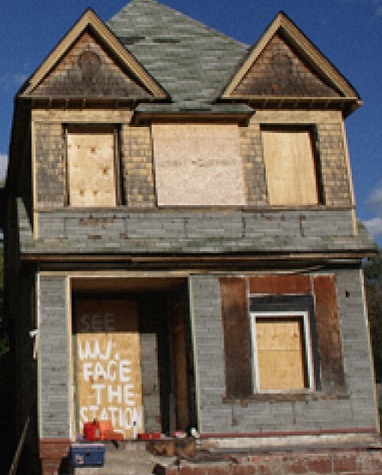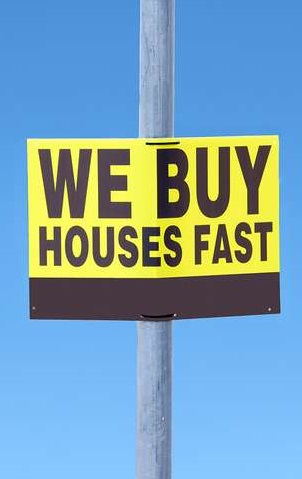Cleveland Housing Watchdog Group Releases Report On Outside Investors, Blueprint For Crackdown On Bad Actors!
FEATURED PHOTO: FRANK FORD, SENIOR POLICY ADVISOR WITH VACANT AND ABANDONED PROPERTY ACTION COUNCIL (VAPAC)

CleveScene.com, By Mark Oprea, Posted March 22nd 2022
A new in-depth analysis of outside investor influence in the Cleveland housing market, one of the largest citywide studies of its kind in the past decade, includes more than two dozen clear-eyed policy recommendations to address what many advocates have called a growing problem.
“It’s a new day,” said Frank Ford, Senior Policy Advisor with Vacant and Abandoned Property Action Council (VAPAC), the think tank that published the study. “It’s the right time to put some bold, creative proposals out there.”
The culmination of two years of presentations and studies of 16 years of housing data, the report’s findings confirm long-held suspicions about Cleveland’s rental market since the U.S. foreclosure crisis ended in 2012: Business buyers—that is, corporations or limited liability companies—have been increasingly adding one-to-three family homes once bought by individuals to their portfolios. (They’ve tripled, to 21 percent, since 2004.) And a growing percentage of these investors are throwing bids down from out-of-state, often in New York, California, or outside the country.
The effect of which has been undeniable on the American and local housing market: Up to 46 percent of all home purchases on the Black-majority east side were made by investor buyers.
“We believe that such activity is part of the larger legacy of continued racial bias in the American housing market,” the report reads, “insofar as households of color are offered an inferior product—substandard housing—at a higher price.”
Though the report clarifies that not the deluge of returns-focused buyers aren’t entirely bad actors, the effect, it said, is inevitably harmful. Fewer and fewer first-time home buyers are landing houses while being swiped away by cash-wielding brokers. With a dwindling housing stock exacerbated by Wall Street hedge fund bulk buying, the VAPAC writers paint the current zeitgeist as “a highly competitive, highly speculative rental real estate market” where “investors are free to play as many games of Monopoly across state lines and national borders as they can afford.”

Spearheaded by housing data guru Timothy Kobie, a business process analyst at Building & Housing, the report’s findings are stark. Most vacant, boarded-up homes purchased are not formally rehabbed. Only about 20 percent of business buyers registered their new rentals from 2017 to 2019. And for landlords that were actually repairing roofs or faulty staircases—bringing homes up to city code—they were only requesting city permits to do so around 10 percent of the time. (For building repairs, only 6 to 8 percent of the time)
Kobie, along with VAPAC’s 15 other committee members, urged the city to rethink how code violators are punished. “Misdemeanor criminal proceedings mean little to an out of state investor,” the report says. “A business does not fear jail time or a criminal record.” Instead, impose, like Franklin County does, $100 fines daily until the owner fixes the drywall.
“We don’t necessarily need to take a strictly criminal approach to code violations,” Kobie said. First, it’s just “making sure we’re identifying everyone with the responsibility to maintain the property.”
Such identification is what Sally Martin, the former South Euclid housing director who Mayor Justin Bibb hired in late January to lead Cleveland’s Building and Housing department, seemed to do well in her prior role. Knowing that negligent owners in Seattle or San Francisco would not fly 2,200 miles to pay $200 fines for annual rental late fees, she and her department lobbied in 2018 to have a “local agent-in-charge” clause added to South Euclid’s housing code. That is to say to the landlord: If you’re not in town, you need to find a surrogate to go to court for you.
Martin’s local agent rule proved effective. During her time heading South Euclid’s department, she prosecuted roughly 80 negligent landlords per year. (Martin did not respond to calls for comment in time for publication.)

Also a key figure in VAPAC’s consortium, it is very likely that Martin will succeed in actualizing some of her previous success in her new role handling Cleveland’s bad actors. (VAPAC’s investor-focused committee was previously called “The Bad Actors Working Group.”) The recommendations to alter city policy—literally from A to Z, 26 of them—read like a progressive housing advocate’s wishlist, including South Euclid’s local agent requirement, a recommendation to add civil forfeiture to the tool belt of city punishments, a call to modernize Cleveland in line with cities like Chicago or Philadelphia by adding Pay to Stay and Right to Counsel legislation.
And a plea to simplify the rehab process. “The City’s website is outdated,” it reads, “and navigating to find information on permitting is daunting.”
While VAPAC’s blueprint for the Bibb administration could make use of the mayor’s proposed $8.9 million 2022 budget for the Dept. of Code Enforcement, it is also possible that tightening up the rental registration process—tougher than it had been during the risk-averse Jackson era—could have unforeseen consequences.
“‘Investors’ is a confusing (term)” in the first place, said Jayme Lucas-Bauer, development project manager at the Old Brooklyn Community Development Corporation. “We (just) want to encourage people who really want to invest and discourage people to come who really want to be abusive.”
For Ford, who has been studying the double-edge nature of outside investing since the early aughts, being clear in VAPAC’s policy recs is just as important as getting the data exact, or lobbying for an added, say, $300,000 to Building & Housing’s pay band.
“Their bad actions reflect on good investors that are trying to do the right thing,” he said.
As for those who’ve skirted the letters in the mail from 601 Lakeside? “I anticipate there’ll be pushback from those investors,” he said, chuckling. “If you don’t want to comply with Cleveland’s ordinances, then go somewhere else.”








